The trouble with rail freight
Page 21

If you've noticed an error in this article please click here to report it so we can fix it.
OLLOVVING Dr Prideaux's preentation, Dennis Baker of lainsbury's said that the lritish taxpayer would even velcome a subsidy for rail reight, but only if there was an ncrease in productivity. He irgued that Dr Prideaux had not ustified an increase in rail reight rate, and suggested that subsidy would not bring more :0-operation between road and ad.
Dr Prideaux in reply said that 3ritish Rail did not enjoy a sub;idy for its freight traffic and ndeed would not welcome a iubsidy. He advanced the argunent that British Rail's producivity record was better than that )f any other rail service in :_urope.
He said that when and if nore capital for investment be:ame available it should be used )y British Rail to develop Coninental services, private terninals and the Freightliner sysem. It was his opinion that 'reightliners had suffered with he introduction of heavier tehicles and the motorway netvork.
James Duncan, chairman 3f Transport Development
ro u p , reminded the conerence that the rail strike of 25 years ago had lost traffic from rail which was gained by road, and that British Rail had not won it back. Mr Duncan argued that road haulage prospered because of the service that individual operators not only offered but made work.
Drawing on his recent involvement in the USA, he said that in competition he could see no merit in quantity control. In his opinion competition was the essence of service.
Donald MacCuish, of the Highlands and Islands Development Board, felt that while the Freightliner was to be commended he could see no merit in British Rail involving itself in investment for vehicles to be employed in collection and delivery work. Dr Prideaux agreed that Freightliners had lost their edge in the late Sixties, but he hoped that with the contraction of drivers' hours and the introduction of tachographs the ser vice that British Rail would offer in opposition to road haulage would benefit. He wanted to see an extension of road / rail cooperation.
Leonard Payne, distribution director of SainsbUry's, said that Freightliners did not meet customer requirements and were much too inflexible. He argued that producers of goods recognised transport as being an extension of their production line and that transport had to be tailored to meet their production-line demands.
Dr Prideaux said that if the customers were not satisfied they did not have to use the service. F. J. Richardson of Hertfordshire County Council, a previous own-account operator, agreed with Mr Payne that the Freightliner service should be tailored for customer demand.
This debate, said Sir Peter. Masefield, could be extended beyond a one-day meeting and he hoped that operators of both road and rail vehicles would come again and discuss the matter further.












































































































